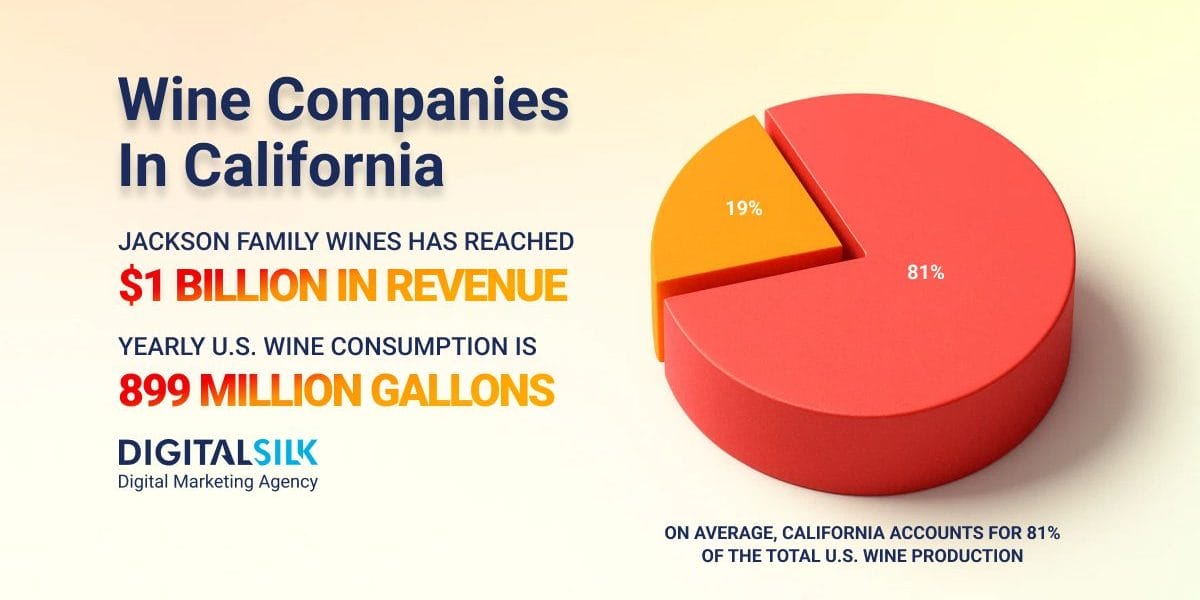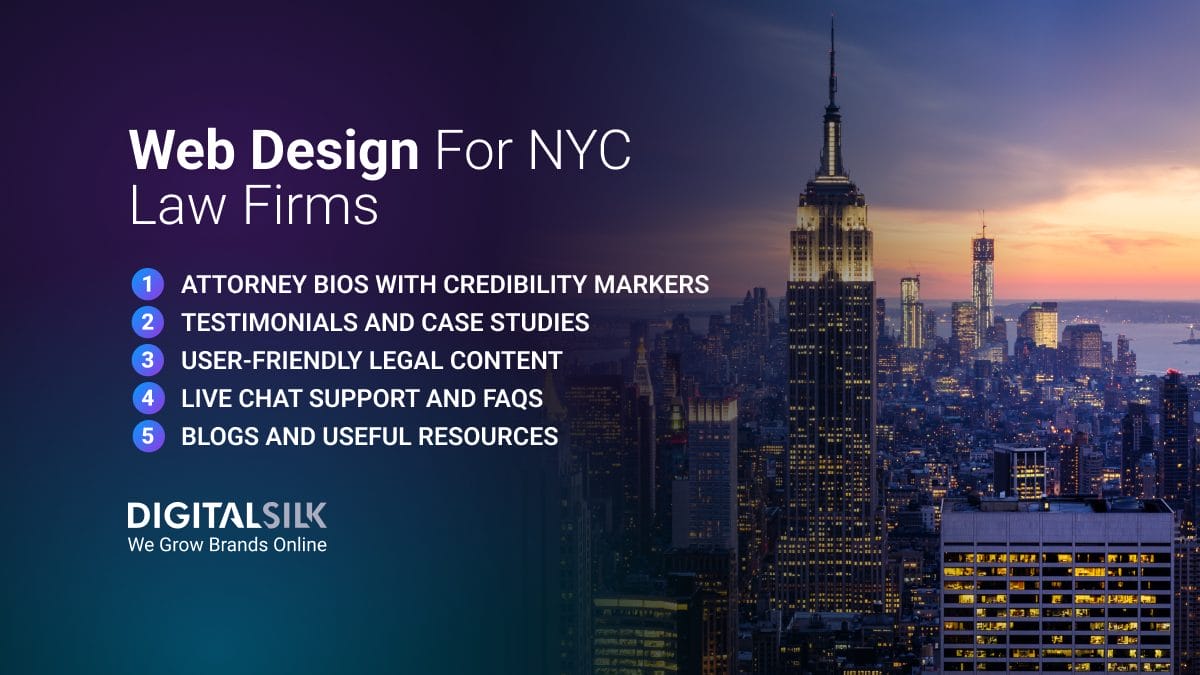Wine Companies In California: Key Highlights
-
California sets the standard: The state remains a global benchmark for quality, innovation and diversity in winemaking.
-
Heritage meets innovation: From century-old estates to new organic pioneers, California wineries blend craftsmanship, sustainability and brand storytelling to stay relevant.
-
Emerging wineries signal the future: Boutique labels are driving the next wave with digital-first models, creative branding and authentic, small-batch experiences.
California is home to more than 6,200 bonded wineries and 615,000 acres of vineyards, accounting for over 81% of all U.S. wine production.
The state’s diverse geography, spanning from cool coastal regions like Sonoma to warm valleys like Lodi, creates ideal conditions for over 100 grape varieties.
This scale makes California the fourth-largest wine producer in the world, trailing only Italy, France and Spain.
For local winemakers, that means standing out is about brand identity, storytelling and customer experience.
This list uncovers the top 20 wine companies in California that continue to shape this sector, influence global trends and inspire the next chapter of winemaking excellence.
Top 20 Famous Wineries In California
As total wine consumption in the U.S. reaches 899 million gallons a year, California is the driving force behind the country’s taste for fine vintages.
Its renowned producers continue to push boundaries with bold experimentation, refined craftsmanship and an instinct for what resonates with today’s discerning drinkers.
The following California wine companies showcase the vision, scale and influence that have made the state a global benchmark in winemaking.
1. Jackson Family Wines
Founded: 1982
Headquarters: Livermore
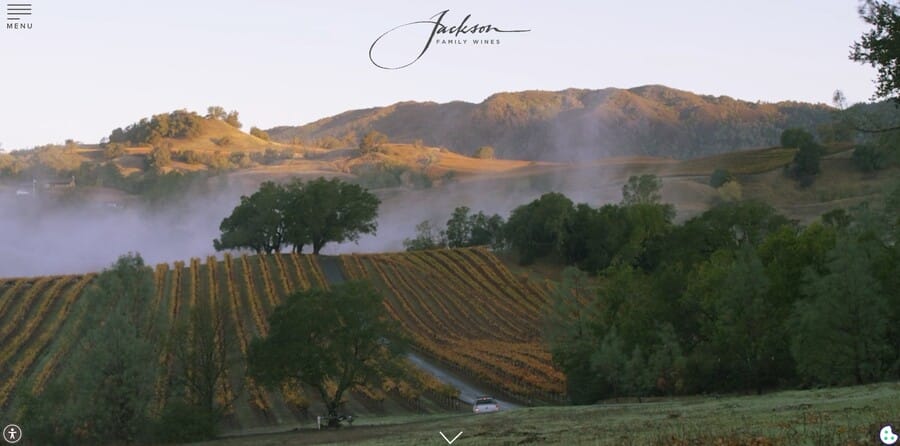
Widely regarded as the largest winery in California, Jackson Family Wines expanded from its humble beginnings in a single vineyard in Lake County into a global name that believes that wine should reflect the place it comes from and the people who care for it.
In 2025, the company reached $1 billion in revenue, yet it continues to honor Jess Stonestreet Jackson’s vision to produce wines that reflect the integrity of the land and the individuality of each vineyard.
Under the leadership of Barbara Banke and the next generation, the family has grown into premier regions across California, Oregon, and beyond, while keeping a farmer’s perspective that values patient work, healthy soils and long-term thinking.
That same perspective drives ongoing investments in sustainability, research, and education, which aren’t treated as side projects but as everyday practices that support better farming, stronger communities and consistently higher quality wines.
2. The Wine Group
Founded: 1981
Headquarters: Livermore
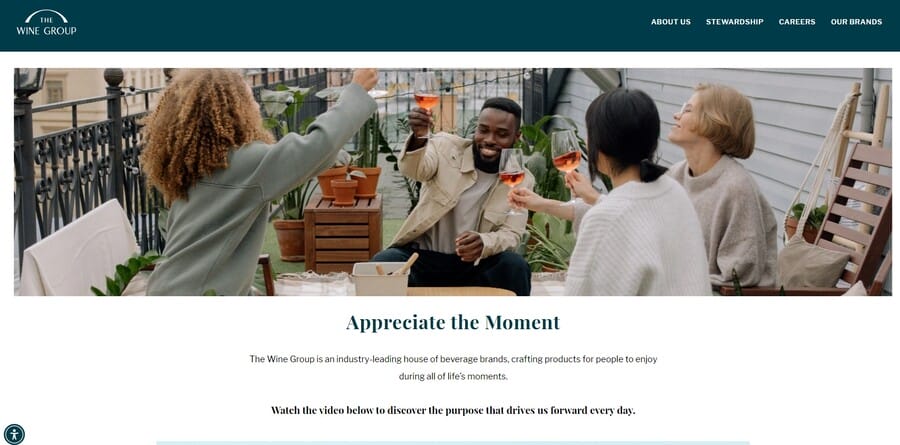
With annual revenue reaching $687.6 million, The Wine Group is one of the largest wine producers in California, known for combining scale with purpose.
As a privately held, management-owned company, it’s built more than 60 award-winning brands over four decades while keeping a culture that celebrates new ideas and holds people accountable for results.
Guided by the simple philosophy “Appreciate the Moment,” the team approaches winemaking with intention, aiming for the right balance of quality, sustainability and positive impact in the communities it serves.
Every bottle is meant to show that mindset in action, reflecting a business that takes responsibility seriously and understands what it takes to create lasting value in a competitive market.
3. Delicato Family Wines
Founded: 1924
Headquarters: Manteca

Delicato Family Wines started as a small family venture and has grown into one of America’s leading wine producers, bringing in $573 million a year in 2025.
Rooted in nearly a century of winemaking tradition, the Indelicato family has turned its dedication to quality and integrity into a defining advantage.
From Gaspare Indelicato’s first vineyard in 1924 to more than 6,000 acres across Napa, Lodi, Monterey, and Sonoma, each generation has added craft, curiosity, and smarter farming.
Today, Delicato ranks among the top five U.S. wine companies, known for producing wines that reflect both California’s diversity and the family’s enduring vision.
4. Trinchero Family Estates
Founded: 1948
Headquarters: St. Helena
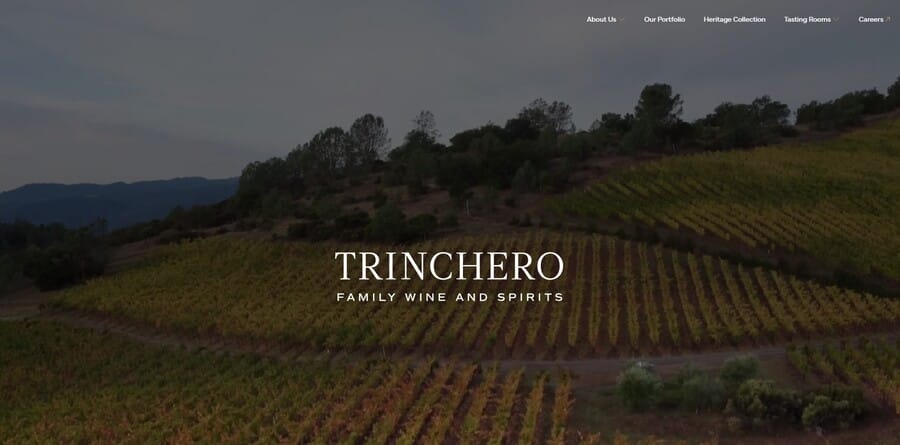
From a modest Napa Valley winery the family bought in 1948 to a global business generating $573 million in revenue, Trinchero Family Estates shows how vision and persistence can shape California winemaking at its best.
What started when Mario Trinchero moved his family west in search of opportunity grew into a legacy of innovation, including the creation of White Zinfandel, a wine that introduced millions of people to California wine.
Today, the company stewards more than 50 brands across California, Washington, Italy, Spain and New Zealand, all guided by careful craftsmanship and a real respect for the land.
With over a thousand people contributing to its continued growth, Trinchero remains a family-led symbol of dedication and ingenuity in modern winemaking.
5. Duckhorn Portfolio
Founded: 1976
Headquarters: St. Helena
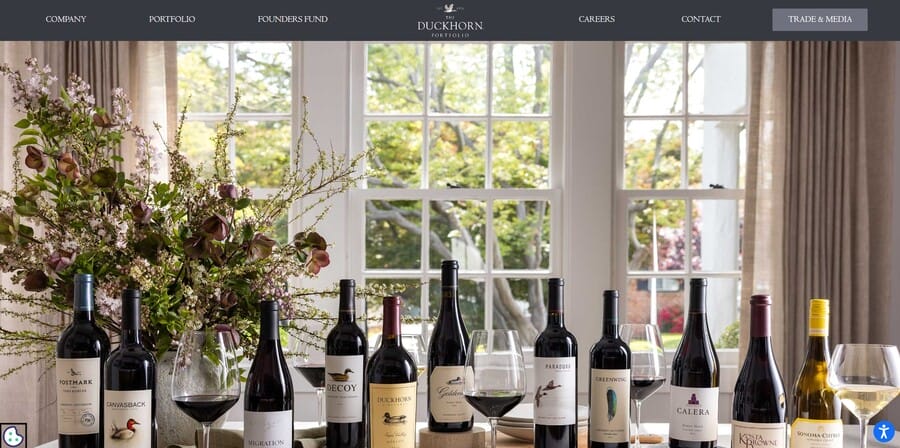
Among the leading wine companies in California, Duckhorn Portfolio generated $411 million in annual revenue through a collection of wineries recognized for their craftsmanship and long-term vision.
Founded by Daniel and Margaret Duckhorn, the winery started with small lot Merlot and Cabernet Sauvignon, then grew into a family of well-known labels like Decoy, Goldeneye, Paraduxx, and Canvasback.
From its roots in Napa Valley to a wider international footprint, Duckhorn has kept its focus on making wines that define consistency and enduring value.
6. Bronco Wine Company
Founded: 1973
Headquarters: Ceres
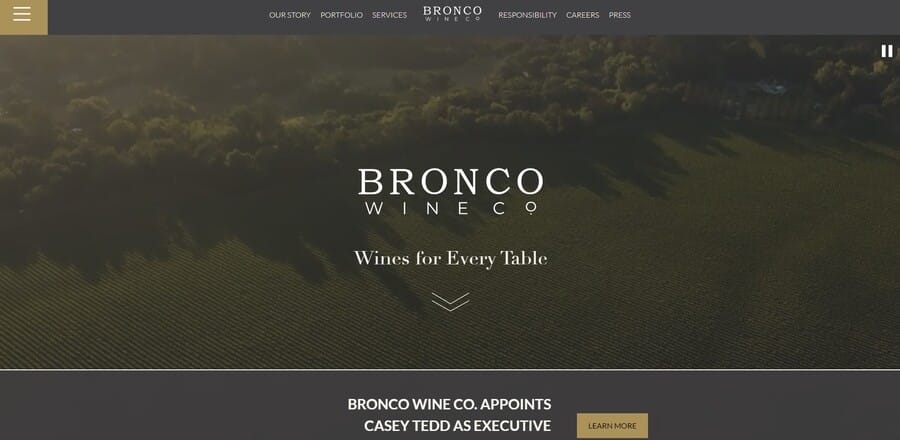
With $300 million in annual revenue, Bronco Wine Company has become a contender for the biggest winery in California, recognized for its ability to align winemaking with real customer pain points and evolving market needs.
Founded by brothers Fred and Joseph Franzia and their cousin John Franzia, Bronco turned generations of family know-how into a fully integrated wine business that owns vineyards, makes the wine and gets it onto store shelves.
This approach enables Bronco to deliver quality and value at scale while maintaining flexibility across its diverse portfolio.
Over the past five decades, its focus on accessibility and innovation has raised the bar for what shoppers expect and pushed competitors to keep up.
7. Bonterra Organic Estates
Founded: 2004
Headquarters: Larkspur
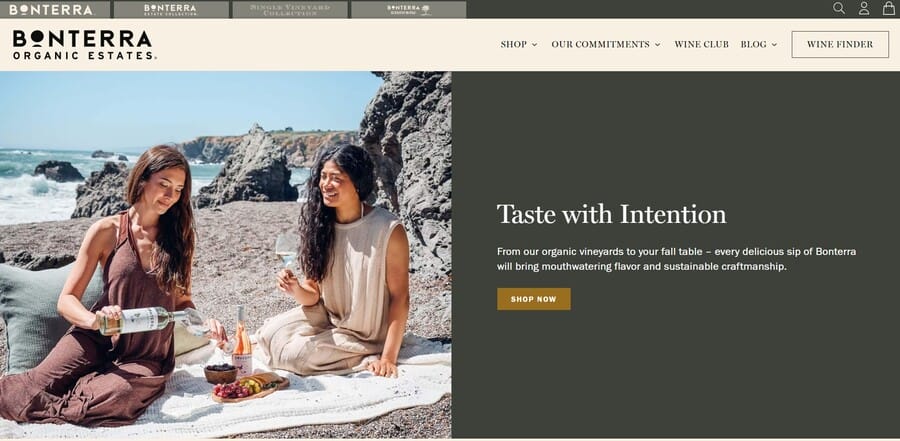
Bonterra Organic Estates generated $273.1 million in annual revenue and continues to lead the conversation around sustainable winemaking as America’s number one organic winery.
Founded by the Fetzer family and inspired by an organic produce garden, the company has built its philosophy on the belief that healthy soil produces more expressive wines and a healthier planet.
In a market where overall wine sales in California declined only 2.3%, Bonterra’s growth and brand resilience reflect how a clear purpose and regenerative practices can align with evolving consumer expectations.
As a Certified B Corporation and the nation’s largest Regenerative Organic Certified® winery, Bonterra demonstrates how environmental responsibility, quality and business performance can thrive together in one enduring model.
8. O’Neill Vintners & Distillers
Founded: 2004
Headquarters: Larkspur
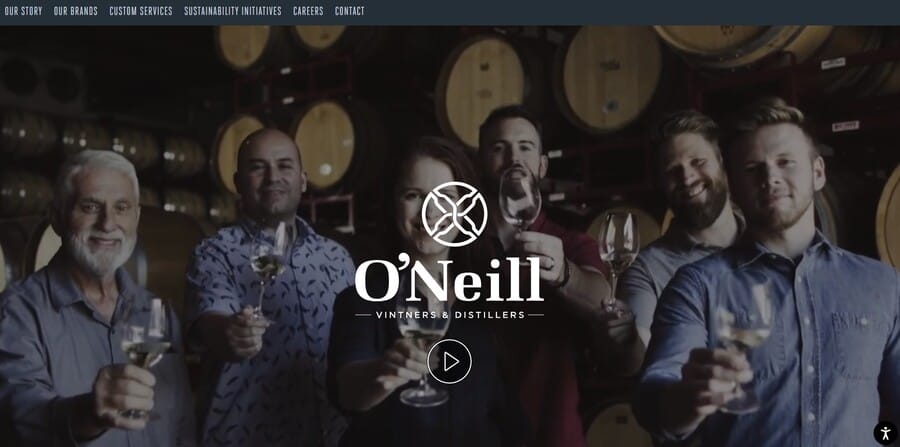
O’Neill Vintners & Distillers has grown into one of California’s fastest-rising producers, generating $171.9 million in annual revenue through a model built on trust, quality and long-term partnerships.
In a market where 41% of U.S. wine consumers show brand loyalty, the company has turned consistency and authenticity into key advantages, building relationships that keep its brands top of mind.
Because O’Neill manages everything from grape to bottle, it can blend hands-on craft with large-scale production without losing what matters, including its commitments as a Certified B Corporation.
Guided by the mission to “inspire a happier and more sustainable world one glass at a time,” the company shows that running a responsible business and running a successful one don’t have to be at odds.
9. Wente Vinyards
Founded: 1883
Headquarters: Livermore Valley
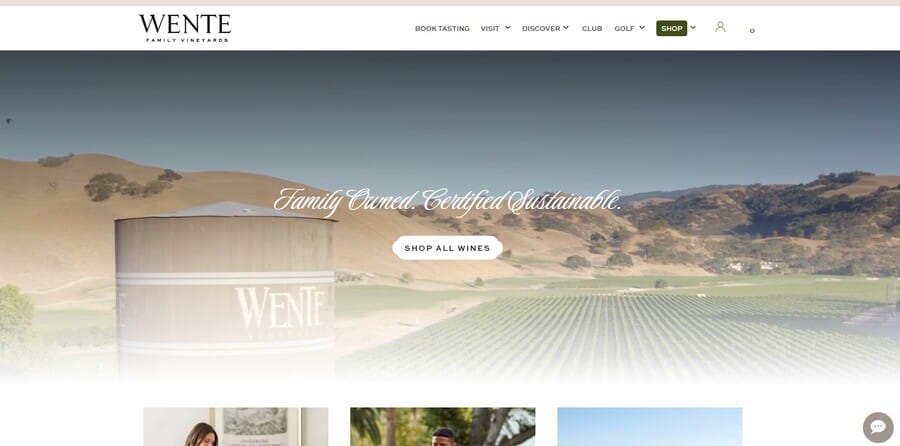
Another name that comes up during the biggest winery in California debate, Wente Vineyards is America’s oldest continuously family-owned winery, with $143.2 million in annual revenue.
Since 1883, the Wente family has guided the winery through five generations, shaping California winemaking with sustainable farming and practical, hands-on expertise.
With more than 3,000 acres in the Livermore Valley and Arroyo Seco, the wines show both the family’s history and the character of each place.
Family members are closely involved in every part of the business, from the vineyards to the cellar to hospitality, so Wente’s values and experience keep influencing the industry for the next generations.
10. Hall Family Wines
Founded: 2003
Headquarters: St. Helena
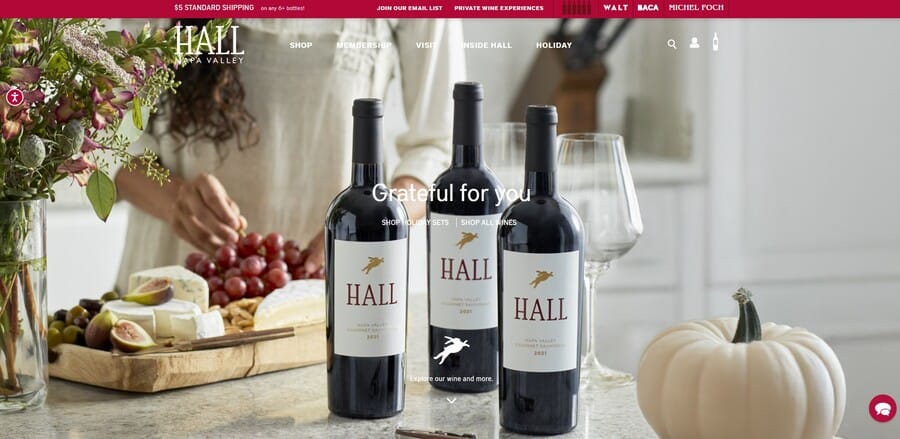
Rooted in Napa Valley’s tradition yet defined by its forward-thinking approach, Hall Family Wines has become one of the biggest wineries in California, with $139.2 million in revenue reflecting its influence across the region.
Kathryn and Craig Hall turned the historic Bergfeld Winery into a place where winemaking, architecture and art meet to create an experience that celebrates both craft and place.
Across more than 500 acres of estate vineyards, they focus on sustainability and precise farming, which helps each varietal show its own character.
From St. Helena to Rutherford, Hall Family Wines works to showcase Napa’s potential while honoring the legacy that made it an icon in American wine.
11. Foley Family Wines & Spirits
Founded: 1996
Headquarters: Santa Rosa
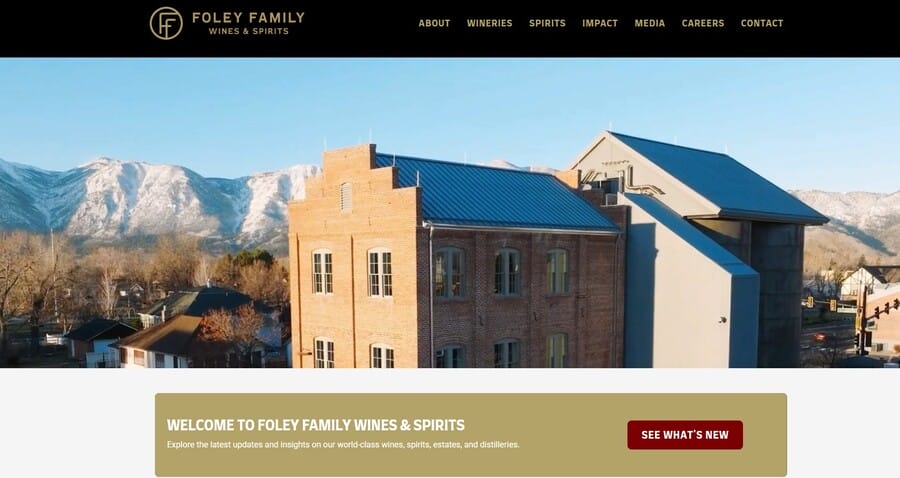
Foley Family Wines & Spirits generated $85.9 million in annual revenue through a portfolio that unites some of the most famous vineyards in California with world-class estates abroad.
Founded by Bill Foley, the company spans more than 25 wineries and distilleries across Napa, Sonoma, Oregon, Washington and New Zealand.
Each estate adds its own history and craft, so the whole collection acts as both a tour of distinct regions and a reflection of a single, clear purpose.
By growing carefully and letting each vineyard’s identity guide decisions, from farming choices to how the wines are blended and presented, Foley Family Wines & Spirits keeps the character of each place visible in the glass while maintaining a coherent portfolio.
12. Crimson Wine Group
Founded: 1991
Headquarters: Napa Valley
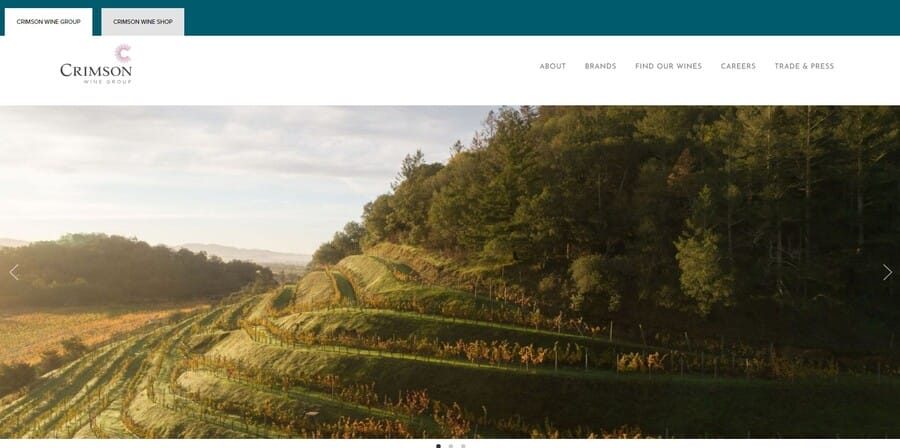
As one of the top 100 wineries in California, Crimson Wine Group reached $71.3 million in revenue by aligning operational efficiency with a clear focus on brand growth and market relevance.
The company’s estate-driven portfolio maintains consistency across multiple touchpoints, including retail, direct-to-consumer channels and hospitality experiences.
Guided by a “people first” philosophy, Crimson invests in its employees, community initiatives and sustainable practices that reinforce long-term brand value.
Through data-driven execution and a commitment to measurable performance, the company continues to expand its influence within the premium wine sector.
13. Riboli Family Wines
Founded: 1917
Headquarters: Paso Robles
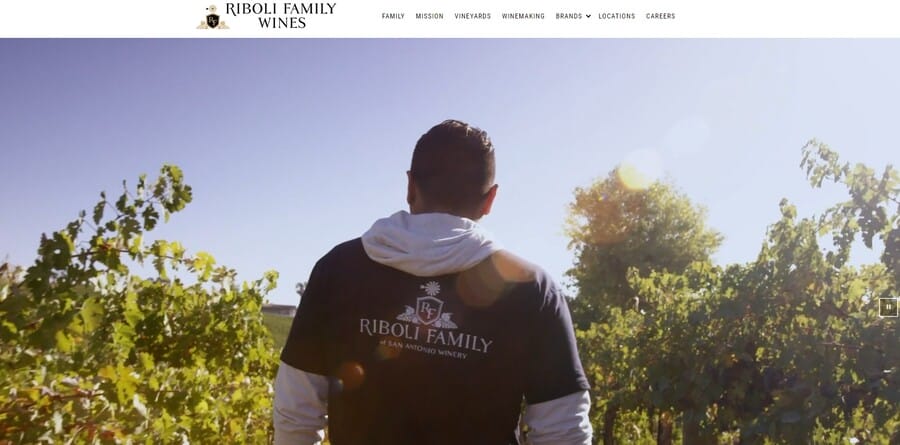
Among the top California wineries, Riboli Family Wines has evolved through four generations of craftsmanship, guided by a belief that progress begins with care for the land and the people who tend it.
With $66.3 million in annual revenue, the company has built its distinctive brand positioning rooted in authenticity and driven by innovation, sustainability and family culture.
Its approach unites time-honored methods with modern techniques to refine the quality of its products without losing the core features that make them unique.
Through this balance of tradition and forward vision, Riboli Family Wines continues to define what longevity and purpose look like in California winemaking.
14. Korbel Winery
Founded: 1882
Headquarters: Guerneville

Among the famous California wineries, Korbel Winery has remained a fixture in the industry for more than a century, with $44.9 million in annual revenue reflecting the enduring strength of its heritage.
Founded by the Korbel brothers in the late 1800s, the winery played a defining role in shaping California’s sparkling wine tradition and bringing it to national prominence.
Its long-standing brand equity stems from consistency, quality and an ability to stay relevant across generations of wine drinkers.
Today, Korbel stays true to where it started while adjusting how it makes and presents its wines to match what today’s drinkers actually want.
15. Boisset Collection
Founded: 1961
Headquarters: St. Helena
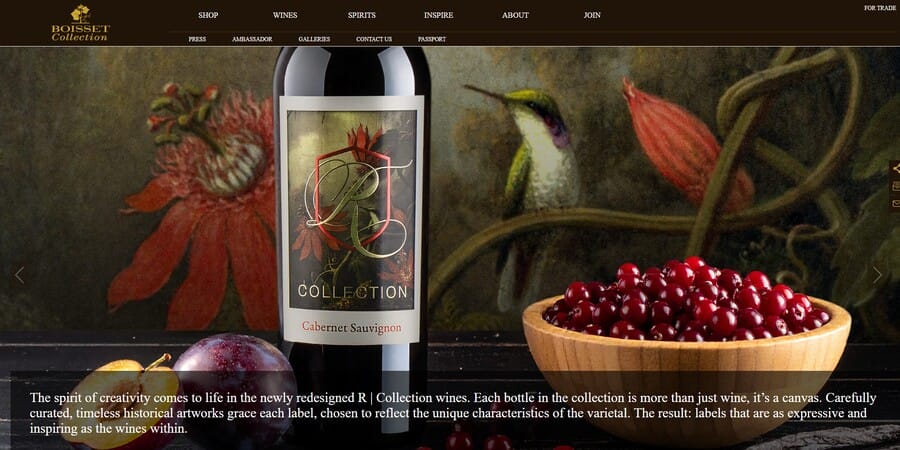
Among the most popular California wine brands, Boisset Collection recorded $37.2 million in annual revenue, reflecting its ability to unite heritage with vision across continents.
Established by Jean-Claude and Claudine Boisset and later guided by their son Jean-Charles, the company brought together historic wineries in California and France, each with its own legacy and character.
Each estate contributes its own legacy while collectively strengthening the collection’s distinctive brand image rooted in elegance, history and creative expression.
By blending family roots with a wider world view, Boisset Collection shows that tradition can grow and change without losing its identity.
16. Gallo
Founded: 1933
Headquarters: Modesto
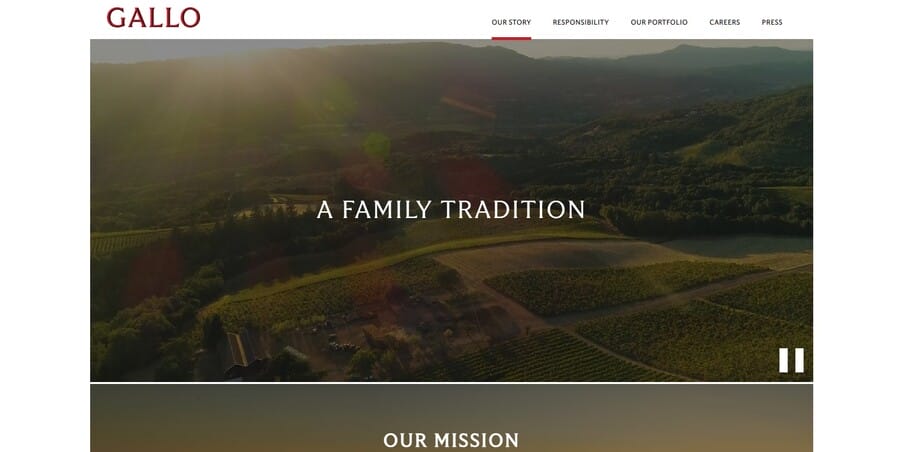
As one of the top wineries in California, E. & J. Gallo Winery has built its reputation on vision, precision and a deep respect for winemaking traditions.
With more than a dozen wineries across California and Washington, Gallo’s experts craft wines from carefully selected fruit grown in premier regions, ensuring every vintage reflects the best of the land.
The company treats innovation as routine work, applying it in sustainable vineyard practices and in research that improves flavor and quality at scale.
Guided by a commitment to people, purpose and progress, it continues to influence the global wine industry while staying true to the principles that shaped its start in 1933.
As part of California’s wine community, E. & J. Gallo Winery’s work adds meaningful weight to the country’s overall output.
17. Silver Oak & Twomey
Founded: 1999
Headquarters: Oakville
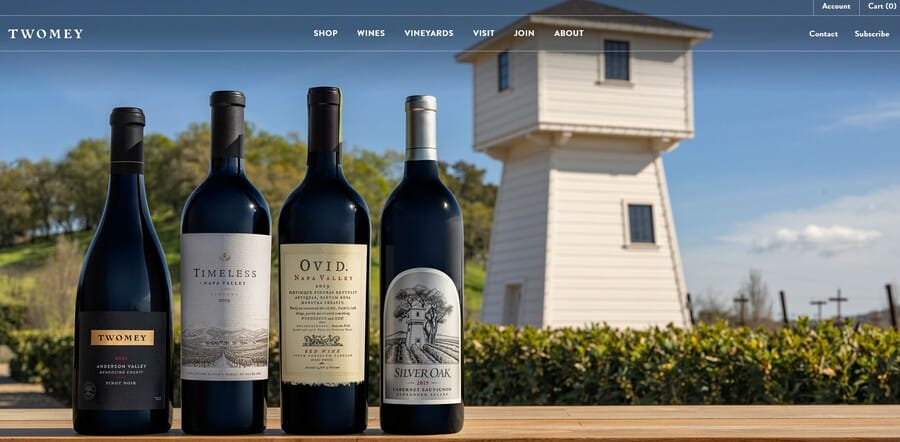
Another name associated with the largest vineyard in California debate, Silver Oak & Twomey reported $32.7 million in revenue and continues to play a defining role in the evolution of modern Napa and Sonoma winemaking.
Founded by the Duncan family, the winery grew from Silver Oak’s focus on Cabernet Sauvignon into a broader portfolio featuring Pinot Noir, Merlot and Sauvignon Blanc from California’s most expressive vineyards.
Their wines are crafted near their source, allowing the unique qualities of each site to shape its final character.
By combining generational stewardship with a forward-looking approach, Silver Oak & Twomey remains one of the most respected names in American wine.
18. J. Lohr Vineyards & Wines
Founded: 1972
Headquarters: San Jose

Among the most recognized California wine brands, J. Lohr Vineyards & Wines generated $29.6 million in annual revenue and continues to reflect the pioneering spirit of its founder, Jerry Lohr.
When he began planting in Monterey and Paso Robles, the regions were unproven, yet his instinct for quality and potential reshaped them into some of the most respected appellations in the country.
Today, J. Lohr farms more than 4,000 acres of estate vineyards, producing wines that reflect both place and precision.
Still family-owned after five decades, J. Lohr remains a model of persistence, quality and long-term thinking in American winemaking.
19. WX Brands
Founded: 1999
Headquarters: Novato

As part of an industry that generated $18.9 billion in U.S. winery revenue in 2024, WX Brands has built its reputation on understanding customer preference and turning that insight into meaningful brand awareness.
With operations in more than 20 countries and annual sales topping 4 million cases, the company has learned how to pair creative brand building with a clear eye on the business.
Its additions of Bread & Butter, Chronic Cellars and Baileyana show a plan built on reading where the market is headed and moving quickly when the fit is right.
Often included on lists of leading California wine brands, WX Brands helps shape how today’s drinkers find wines they like and stay connected to them across the world.
20. Bogle Family Wine Collection
Founded: 1968
Headquarters: Clarksburg
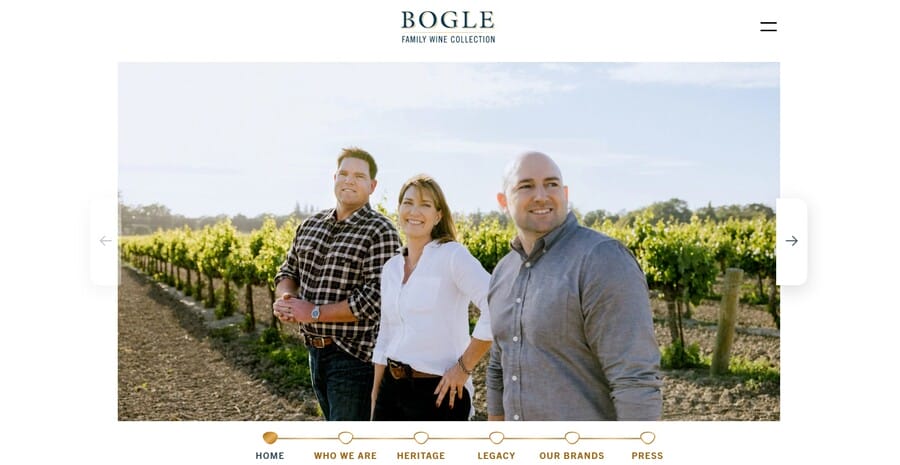
Bogle Family Wine Collection has grown into one of the most respected family-owned wineries in the country, generating $30.8 million in annual revenue in 2025 while preserving its hands-on approach to winemaking.
The company’s focus on artisan craftsmanship is evident in its 95,000 small oak barrels and its practice of aging and stirring wines with exceptional care.
All 2,100 estate vineyards are Certified Green, reflecting a long-term commitment to sustainability and stewardship of the land.
Through thoughtful marketing rooted in authenticity and family heritage, Bogle continues to build lasting connections with consumers who value quality, trust and genuine character in every bottle.
Beyond The Top 20: Emerging California Wine Brands
While the top producers dominate market share, California’s wine innovation often begins with smaller, digitally native wineries.
Some of the fastest-growing boutique brands include:
- Tank Garage Winery (Napa Valley): Known for creative, art-driven labels and a direct-to-consumer club model.
- Matthiasson Wines (Napa): Sustainability-focused, producing small-batch organic wines.
- Scribe Winery (Sonoma): Attracts younger audiences through authentic storytelling and immersive experiences.
- Tablas Creek Vineyard (Paso Robles): First in the U.S. to earn Regenerative Organic Certified® status.
These emerging brands can signal where the market is headed: smaller production, more impactful storytelling and digital-first customer experiences.
How To Position Your Winery For Long-Term Recognition
With the number of wineries in California nearing 2,800 and still rising, long-lasting visibility requires aligning brand identity, digital execution and the way you engage with your audience across every platform.
The following strategies outline practical ways to help your winery earn attention and loyalty in a competitive market:
1. Tell A Story That People Remember
A winery’s narrative should feel real and rooted in its origin.
When you consider how many wineries are in California, the ones that thrive are those that articulate why they exist and what they stand for in a way that connects emotionally.
For instance, Bonterra Organic Estates connects its organic mission with environmental storytelling, increasing brand loyalty among eco-conscious buyers.
2. Design A Website That Feels Like Your Estate
Your core website elements should evoke the same feeling as a tasting room: welcoming, elegant and true to your identity.
Simplify navigation, highlight virtual tours and integrate online booking and membership options.
3. Make Data Your Sommelier
With over 5,800 wineries in the U.S. producing fewer than 1,000 cases per year and only 76 operating at a large scale, visibility is limited real estate.
Use visitor analytics, SEO data and conversion insights to refine your marketing.
4. Focus Marketing Where Intent Meets Emotion
Invest in content that intersects with customer search intent (“best Napa Cabernet wineries”, “eco-friendly wine brands”) to build organic discovery.
5. Let Performance Guide Your Next Move
With 73% of Central Valley wineries describing the past year as disappointing, adapting based on data is vital to your organic visibilty and user traffic.
Analyze conversions, visitor engagement and referral sources to refine how you attract, nurture and retain your audience.
6. Turn Visitors Into Members
Long-term visibility comes from relationships, not one-time transactions.
Personalized outreach, tailored offers and digital experiences keep your winery top of mind and create the kind of loyalty that sustains growth over time.
Improve Your Winery’s Visibility With Digital Silk
Visibility in the wine industry comes from storytelling that feels genuine and experiences that reflect the care behind every bottle.
Wineries that approach their brand with intention build recognition that lasts and creates meaningful connections with their audience.
Digital Silk uses comprehensive digital strategies that align web design, branding and marketing to help wineries communicate their value, attract the right audiences and achieve long-term growth.
As an end-to-end digital marketing agency, our services include:
Contact our team, call us at (800) 206-9413 or fill in the Request a Quote form below to schedule a consultation.
"*" indicates required fields


